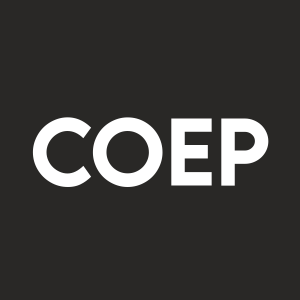Coeptis Therapeutics to Pursue Phase 2 Program Using Proprietary First-in-Class Allogeneic NK Cell Therapy for the Treatment of Viral Infections
Novel NK cell therapy approach is designed to bolster and replenish the immune system during severe viral infection, which can severely reduce immune cells leading to hospitalization and death
DVX201, the first-ever allogeneic, cord-blood derived NK cell therapy generated from pooled donor CD34+ hematopoietic stem and progenitor cells (HSPC) cells, is designed to supply a boost of healthy immune cells to potentially help fight the infection by directly infusing them into the patient's body.
DVX201 NK cells are generated from cord blood cells (from birth tissue), a well understood and FDA regulated source of cells, that has been infused into patients for over 20 years. DVX201 is produced by pooling CD34+ cells isolated from multiple cord blood donations to increase lot size and immune system diversity. Importantly, doses undergo stringent testing including a potency assay before treatment, to assess their ability to kill virally infected cells. Additionally, DVX201 does not contain T-cells, which significantly reduces the possibility for major rejection by patients, which is a major concern for some cell therapy products.
"We're excited to progress the clinical development of this therapy to test a truly novel approach, treating severe viral infections with live cells to replenish and bolster patients' immune systems," said Colleen Delaney, MD, MSc, Chief Scientific and Medical Officer. "An important aspect of viral infections that are often observed in patients hospitalized with viruses like the flu, COVID-19, and RSV, often referred to as the tripledemic, is the challenges they present to immune cells. The immune system works hard to kill virally infected cells but, in many cases, struggle to keep up and become depleted, leading to severe infection, worsening symptoms, hospitalizations, and even death."
Dr. Delaney added: "Our first step is to fully explore key safety measures because this is a very novel approach to treating hospitalized viral infections with a first-in-class universal therapy. We have started dosing DVX201 at low doses and escalated upwards to almost 1 billion cells in a single infusion. For context, the body normally has around two billion NK cells at any given moment."
In two Phase 1 clinical trials for the treatment of relapsed/refractory acute myeloid leukemia (AML) or high-risk myelodysplastic syndrome (MDS) and patients hospitalized with COVID-19 infection, interim data for a total of 17 patients and 25 infusions of DVX201 have indicated that the NK cell therapy is well-tolerated with no dose limiting toxicities (DLTs). Further, there have been no observed cytokine release syndrome (CRS) or infusion toxicities thus far, even through the highest dose level.
"Based on these favorable Phase 1 results to date, we are excited to advance plans for a Phase 2 clinical program investigating DVX201 as an anti-viral therapy in high-risk patients hospitalized with viral respiratory infections," said Dave Mehalick, President and CEO of Coeptis Therapeutics. "The tripledemic of flu, RSV, and COVID represents a serious challenge for our healthcare system for the foreseeable future. When vaccinations aren't sufficient and/or when vaccination rates are below levels necessary to stave off future epidemics, we believe this NK cell therapy approach has the potential to be an important treatment, either as monotherapy or in a complementary approach for severe infections. DVX201, the first-ever allogeneic, cord-blood derived NK cell therapy generated from pooled donor CD34+ HSPC cells, has the potential to offer significant support to patients and to our strained healthcare system."
Since the COVID-19 pandemic, seasonal infections for the three viral infections have been elevated, and the CDC highlights last year's 2022-2023 "tripledemic" in which weekly hospitalization rates exceeded 20 per 100,000. If this season follows with a severe flu and RSV, and with a moderate overlapping COVID-19 wave, the CDC warns that it expects similar impacts and hospitalizations placing a severe strain on the healthcare system. A truly global concern, The World Health Organization estimates that nearly 7 million people have died from COVID-19 worldwide since the 2020 pandemic. It also estimates the impact of seasonal flu, killing approximately 290,000 to 650,000 people per year, while RSV may be responsible for 29,000 deaths per year.
About Coeptis Therapeutics Holdings, Inc.
Coeptis Therapeutics Holdings, Inc., together with its subsidiaries including Coeptis Therapeutics, Inc. and Coeptis Pharmaceuticals, Inc., (collectively "Coeptis"), is a biopharmaceutical company developing innovative cell therapy platforms for cancer and infectious diseases that have the potential to disrupt conventional treatment paradigms and improve patient outcomes. Coeptis' product portfolio and rights are highlighted by assets licensed from Deverra Therapeutics, including an allogeneic cellular immunotherapy platform and DVX201, a clinical-stage, unmodified natural killer cell therapy technology. Additionally, Coeptis is developing a universal, multi-antigen CAR T technology licensed from the University of
Cautionary Note Regarding Forward-Looking Statements
This press release and statements of our management made in connection therewith contain or may contain "forward-looking statements" (as defined in Section 27A of the Securities Act of 1933, as amended, and Section 21E of the Securities Exchange Act of 1934, as amended). Forward-looking statements include statements concerning our plans, objectives, goals, strategies, future events or performance, and underlying assumptions, and other statements that are other than statements of historical facts. When we use words such as "may," "will," "intend," "should," "believe," "expect," "anticipate," "project," "estimate" or similar expressions that do not relate solely to historical matters, we are making forward-looking statements. Forward-looking statements are not a guarantee of future performance and involve significant risks and uncertainties that may cause the actual results to differ materially and perhaps substantially from our expectations discussed in the forward-looking statements. Factors that may cause such differences include but are not limited to: (1) the inability to maintain the listing of the Company's securities on the Nasdaq Capital Market; (2) the risk that the integration of the Deverra licensed assets will disrupt current plans and operations of the Company; (3) the inability to recognize the anticipated benefits of the newly-licensed assets, which may be affected by, among other things, competition, the ability of the Company to grow and manage growth economically and hire and retain key employees; (4) the risks that the Company's products in development or the newly-licensed assets fail clinical trials or are not approved by the
CONTACTS:
Coeptis Therapeutics, Inc.
Andy Galy, Sr. VP of Communications
andy.galy@coeptistx.com
Tiberend Strategic Advisors, Inc.
Investors
Daniel Kontoh-Boateng
dboateng@tiberend.com
Media
David Schemelia
dschemelia@tiberend.com
![]() View original content to download multimedia:https://www.prnewswire.com/news-releases/coeptis-therapeutics-to-pursue-phase-2-program-using-proprietary-first-in-class-allogeneic-nk-cell-therapy-for-the-treatment-of-viral-infections-302055678.html
View original content to download multimedia:https://www.prnewswire.com/news-releases/coeptis-therapeutics-to-pursue-phase-2-program-using-proprietary-first-in-class-allogeneic-nk-cell-therapy-for-the-treatment-of-viral-infections-302055678.html
SOURCE Coeptis Therapeutics, Inc.








